Rulers of the Great Powers 1901-1914
England
France
Germany
Italy
Russia
Austria
Turkey
![]()
![]()
![]()
![]()
![]()
![]()
![]()
![]()
![]()
![]()
Kings
Prime Ministers
 |
Robert Arthur Talbot Gascoyne-Cecil, 3rd Marquis of Salisbury 1830-1903 (Conservative) PM in 1885, from 1886-1892, and again from 1895-1902. Resigned at end of South African War, designating his nephew Arthur James Balfour as his successor. The easy path Balfour then faced led to the British phrase "Bob's your uncle" to indicate when something is easy because of family connections. This guy is Bob.
|
|
|
Arthur James Balfour 1848-1930 (Conservative) PM from 1902-1905. Nephew of the Marquis of Salisbury, he succeeded his uncle in 1902. He is the Balfour of the "Balfour Declaration" that pledged support for a Jewish Zionist homeland in Palestine that eventually led to the creation of Israel. Created Earl of Balfour in 1922. Glaswegian. |
 |
Henry Campbell Bannerman 1836-1908 (Liberal) PM from 1905-1908. Opposed South African War. Retired for health reasons. Pushed through self-government for the Transvaal and the Orange Free State. Scottish. |
| Herbert Henry Asquith 1852-1928 (Liberal/Coalition) PM from 1908-1915 as head of a Liberal Government, and from 1915-1916 as head of a Coalition Government. Passed Parliament Act that stripped the House of Lords of its veto power, built English navies to rival German sea power, worked towards Irish home rule. Also responsible for old age pensions and unemployment insurance in Britain. Not a great wartime leader, however. |
![]()
![]()
![]()
![]()
![]()
![]()
![]()
![]()
![]()
![]()
Presidents
Premier Ministres
![]()
![]()
![]()
![]()
![]()
![]()
![]()
![]()
![]()
![]()
Kaiser
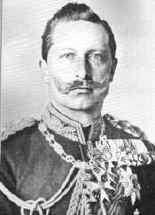 |
Kaiser Wilhelm II (1859-1941)
(Frederick Wilhelm Viktor Albert of Hohenzollern) |
Chancellors
|
|
Bernhard Heinrich Martin, Fürst von Bülow (1849-1929) Chancellor 1900-1909. Isolated Germany by failing to improve relations and gain an alliance with England. Aggravated the French during the Moroccan crisis of 1905. Alienated Russia during the Bosnian crisis of 1908. Lost the confidence of the Kaiser by not editing his remarks to the Daily Telegraph in 1908, which led to the Kaiser revealing his foreign policy towards Britain (it wasn't all that friendly) to a London newspaper. Lost support in the Reichstag over a tax bill and was forced to resign in 1909. Later ambassador to Italy (what were they thinking?) |
| Theobald von Bethmann-Hollweg (1856-1921) Built up German war machine. With Tirpitz, increased navy size dramatically. Tried to use Austro-Serbian crisis to break encirclement by Allies.Worked for US mediation of Great War and restricted submarine warfare to try to keep U.S. out of war. |
![]()
![]()
![]()
![]()
![]()
![]()
![]()
![]()
![]()
![]()
King
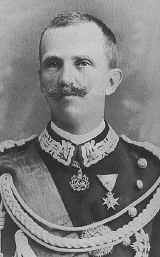 |
Victor Emmanuel III (1869-1947)
Ruled Italy 1900-1946. Became King of Italy when his father Humbert I was assassinated. In 1922, he handed over power to Mussolini and became essentially a figurehead. Though allied with Germany and Austria before World War I, he eventually joined the Allies against the Central Powers. Self-declared King of Albania and Ethiopia in the 30's. He abdicated in 1946. |
Prime Ministers
![]()
![]()
![]()
![]()
![]()
![]()
![]()
![]()
![]()
![]()
Czar (Tsar)
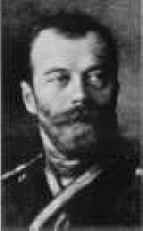 |
Tsar Nicholas II (1868-1918) Tsar Nicholas II was very regal, but also only 5' 6" tall. Grew up surrounded by secret police and palace guards. This made him paranoid about the people not very effective politically. Married "down" to a German princess Alex of Hess. At outbreak of WWI, went to the front to command his troops leaving Czarina Alexandra Feodorovna and her advisor Rasputin in charge. This was a mistake. He was forced to abdicate by the Bolsheviks in 1917 thanks to severe food and materiel shortages for his troops, He ended up wth a severe case of lead poisoning on July 16, 1918 in Yekatinburg courtesy of Lenin's men. |
Prime Ministers
![]()
![]()
![]()
![]()
![]()
![]()
![]()
![]()
![]()
![]()
Kaiser
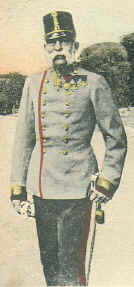 |
Kaiser Franz-Joseph I (1830-1916)
Made Emperor of Austria on his 18th birthday. Later made
King of Hungary in an attempt to shut the Magyars up. This worked
and retained both crowns under the Dual Monarchy. The symbol of this
Monarchy is the double-headed eagle. Was determined never to lose his
Balkan territories to Serbia. Very popular with his people. |
Prime Minister
| Dr. Franz von Koeber I couldn't find anything on this guy, not even his lifespan, but this little morsel of Babel Fish translation appears on one of the few pages with "Koeber" on it: "The Babalou does not smell when screwing, it on smells rule quite - somehow after a mixture from Baileys and asking IDA de Coco, energizing, sueffig and nobly. There runs the hobby drunkard already with the Schnueffeln spit in the mouth together. The taste of the Gebraeus is singularly good, and arrives only chremig likoerig on the tongue nerves, in order to then let in the issue nevertheless again the attached Whisky through, which gives a hard and full of seeds note to the cream sahnelikoer. After the last drop left the bottle, a pleasant warmth in the neck makes itself broadly - nice and suitably each fire-place evening. Babalou is a typical flat man, with whom one does not notice at all, how quickly one the alcohol rises therein into the heading." Just thought I'd share. Notes appreciated. |
![]()
![]()
![]()
![]()
![]()
![]()
![]()
![]()
![]()
![]()
Sultan
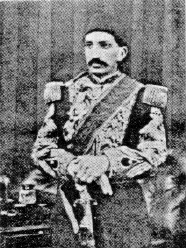 |
Sultan Abdul Hameed (1842-1918) Given the Khalifship in 1876. "Fought" with one of his ministers Midhat Pasha to prevent war with Russia. They went to war anyway and when it didn't go so well, Pasha was exiled to Europe. Later ventured into the Balkans, where after being "misled" again by a minister, the Turks suffered a humiliating defeat. Strengthened ties to Germany He did build many public facilities in the chief cities of the empire during his reign (Cairo, Damascus, Istanbul, etc...) and reduced public debt. However, he was doomed when he was deposed by the Young Turks in 1909. A rather interesting if not-so-objective biography of him appears here. |
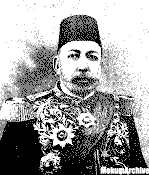 |
Sultan Mehmet V Reshat (1844-1918) |
![]()
![]()
![]()
![]()
![]()
![]()
![]()
![]()
![]()
![]()
If you know more about the more elusive people on this list, please let me know.